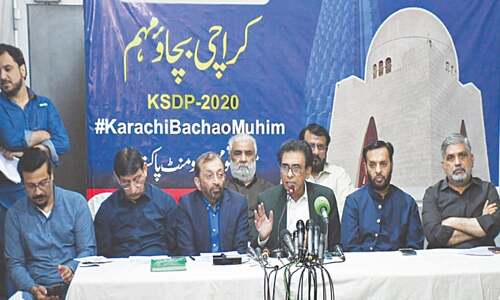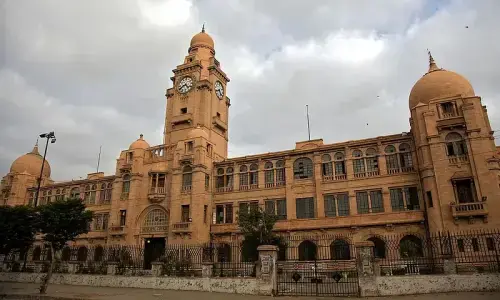KARACHI, March 22: Declaring the provision of safe drinking water, sanitation facilities and attention to hygiene in schools as important factors for overall youth health, speakers at a forum on Thursday called on both the government and the community to fulfil their responsibilities.
They said that inadequate availability of drinking water and toilets contributed to the lower enrolment and high drop-out rates of girls from schools, while ignorance of hygiene and healthy drinking practices in homes also caused diarrhoeal and other diseases, particularly among children.
The forum titled “Roundtable on school water and sanitation programme” was organised by the Indus Resource Centre (IRC), an NGO working for sustainable social and economic development in marginalised populations, particularly in Sindh.
The participants, belonging to various NGOs, donor agencies and the education, health and economic sectors, were informed that the total volume of water on earth was about 1.4 billion km3, while the volume of freshwater resources was around 35 million km3, or about 2.5 percent of the total volume, and this situation demanded a judicious distribution and use of water.
Regarding the water, sanitation and hygiene (WASH) situation in Pakistan, one of the presenters said that almost 50 per cent of Pakistanis lacked access to clean drinking water, while only 42 per cent had access to sanitation facilities – 65 per cent in urban and 35 per cent in rural areas.
“One in three schools has no safe drinking water, and half of all schools have no proper sanitation facilities. Due to illiteracy, many people do not have a clear understanding of the link between poor hygiene and the spread of diseases”, it was further said.
Highlighting the role of IRC in the provision of drinking water to schools and raising awareness of the dangers of water pollution, another presenter said that the IRC’s team even found high levels arsenic contamination in the drinking water at some of the schools surveyed by it under the “Water, Environmental Sanitation & Hygiene Promotion” project, which was funded by Water Aid Pakistan and was on the verge of completion.
The purpose of the project was to build the capacity of schools to become instrumental in hygiene promotion among children and communities; and to promote better understanding of the critical roles that water conservation and environmental sanitation, among other things, play in human development and survival.
Of the 120 surveyed schools (primary to higher-secondary) located in Dadu district, 80 had sweet water, while 20 had brackish or salty water and quality at another 20 schools could not be ascertained.
With regard to sanitation, it was said that 130 toilets in the schools in question were meant for teachers, 68 for boys, 59 for girls, while 54 were found dysfunctional. Nineteen schools had arrangements for daily cleaning of the toilets, 36 had weekly arrangements three were cleaned on monthly basis, while 62 of the schools had no arrangement for cleaning.
As many as 30 schools were selected for IRC WASH interventions on the basis of vulnerability (missing facilities), enrolment, gender and urban/rural. Water samples collected from 15 schools in the first year of the project were sent to the Pakistan Council of Research in Water Resources. Water from six of the schools, located in three union councils - Mounder, Pipri and Dadu UC-4 - was highly contaminated with arsenic.
“During the projects we worked for the supply of clean water supply, provision of toilets, sensitisation of teachers, students, parents and the communities in question and results have been encouraging,” said Sadiqa Salahuddin, director IRC.
She, however, stressed on long-term behaviour change interventions, and mentioned that the IRC model could be included in a bigger intervention system. Community ownership was also essential for success, she added.
Among others, Bakht Brahmani, Safdar Saeed, District Education Officer Dadu Ghulam Ali, Apa Zohra - a teacher from UC-4 Dadu -also spoke. Lauding the work pertaining to WASH facilities, they reiterated the need for WASH standards to be replicated in public schooling by the government.
During the panel discussion following the project presentation, Prem Chand from Unicef said that the IRC forum held on the occasion of the WWD was an important contribution towards water and sanitation improvement efforts, particularly in schools of the country.
He informed the audience that Unicef experts had presented a draft in regard to minimum water and sanitation standards in schools in 2009, which was approved by the education ministry as well, but its implementation was yet to be witnessed.
He said that according to estimates, water, sanitation and hygiene-related diseases cost Pakistan’s economy about Rs 112 bn per year in terms of health cost and lost earnings, which could be avoided.Economist Dr Kaiser Bengali said there was a dire need to focus on schools and inculcate WASH practices by involving not only the students, but the homes and communities as well as the government. Efforts should also be made to provide information to children through mass media and production of short duration cartoons depicting the application and importance of WASH practices.
Qaiser Rasheed of UN Habitat, Zofeen T Ibrahim and a couple of representatives from NGOs also participated in the discussion.

































